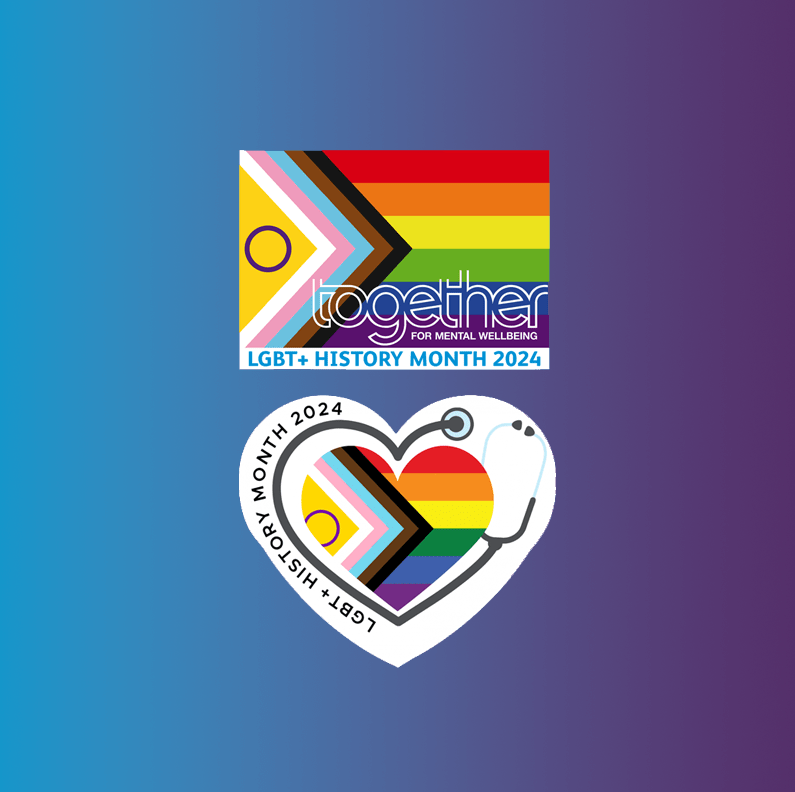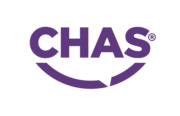Blog on experience of accessing healthcare as an LGBTQ+ person for LGBT+ History Month
LGBT+ History Month 2024 runs through February and the theme for this year is Medicine – #UnderTheScope which celebrates LGBT+ peoples’ contribution to the field of Medicine and Healthcare both historically and today.

The organisers also wanted people to shine a light on the history of the LGBT+ community’s experience of receiving healthcare which for some, can been extremely complicated, leaving LGBT+ people still facing health inequalities today.
Considering that theme, we asked our staff and volunteers at Together who are part of the LGBTQ+ community if they would like to share lived experiences. We’re delighted to share a considered and thoughtful piece written by a member of staff at Together who will remain anonymous and they wrote that around the following questions:
- Have there been any times when you have faced any barriers or experienced a lack of understanding when looking to access healthcare or mental health support as a person who identifies at LGBT+ and if so, what impact did that have on your mental health and wellbeing?
- When accessing healthcare or mental health support have there been times when professionals providing that support have gone above and beyond to work alongside you and understand issues or situations that affect you specifically as a person who identifies as LGBT+?
The member of Together staff shares their lived experience on these questions below:
When I’m asked which gender I identify as on a form, I will usually tick ‘non-binary’, leaving the man and woman boxes empty. “Non-binary” as a literal box to tick won’t always define how a person feels completely, they might prefer to tick all the boxes, none of the boxes, or self-describe; but that’s rarely an option. It’s helpful that the term non-binary is so widely used in the media that most people know that it quite often means ‘my pronouns might be different’ or ‘I don’t identify strictly as a man or woman so I might not relate to terms and stereotypes relating to a binary gender’. It’s often ‘easier’ or mandatory to tick one box.
When my partner and I started talking about having a child we’d already had plenty of conversations about our respective gender. We had recently come out to our family and colleagues – our friends had been aware for quite some time that we didn’t fit in the binary boxes – letting them know we didn’t identify with the terms we were assigned at birth. So, whilst planning for parenthood, I decided to come out to the NHS!
Midwives are amazing. Their priority is to support the health and wellbeing of the pregnant person and the baby or babies. Sometimes a question would come up like ‘What should I say instead of Mummy?’, which would make me feel alerted to the potential of more invasive questioning that might follow. However, for most appointments they waited for me to offer information about myself. They know that building trust makes for better outcomes for all patients in their care and seemed to embrace the opportunity to deliver care in a slightly different way. That slightly different way was one that enriched the experience for us both. I didn’t see the same person every time I walked into the midwife’s office every few weeks for 9 months, but throughout, the care was consistent and respectful. They did this by using genderful terms and my preferred name rather than the one on my medical records.
Speaking in a way that felt familiar made it easier to receive care and hear advice, and for this, I am grateful. When someone misgenders or ‘deadnames’ a trans or non-binary person, at the very least it can be distracting. That can cause the person to miss a vital piece of advice, but it can also have a negative impact on the individual’s mental health, causing episodes of anxiety and depression.
I haven’t always received acceptance. I have been turned away from talking therapies and directed to LGBT+ services in the community. One nurse Googled and found a video, which used non-inclusive language, rather than discussing options of contraception with me, which was the reason I was there. At my little one’s first immunisation appointment, the GP shared some woefully misinformed opinions and asked me if I’m ever referred to as ‘It?’. This coincidentally was the first night my little one slept right through, for 10 hours… needless to say, I didn’t benefit and spent the night thinking of what I could’ve said.
With every appointment, I mentally prepare myself and accept that the person I’m about to see may not use my preferred name or gender-neutral terms. It may be that they are not informed about gender inclusivity, they might realise too late that they said ‘the wrong thing’ or maybe they just don’t ‘get it’. There will always be people who say and do things that upset you, when it comes to gender, based on my experiences and I’m usually prepared.
We’re all learning, I don’t expect people to be able to switch their language with ease, but I’m grateful to people who do. So, I’m especially thankful to every nurse, midwife, and health visitor who supported me while I was pregnant, right up until my child’s two-year review (which was last month, and an appointment that felt like meeting with a friend).
Whether the healthcare professional saw ‘non-binary’ on my records, a scribbled note on my file, or asked me about myself, those who used genderful and inclusive language to support me and my family, made us feel respected and safe, at times when we were feeling vulnerable. With those considerations we were able to receive a better standard of care and we flourished.
Together would like to thank the member of our team for taking the time to share their insights with this blog.




